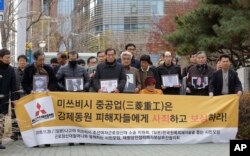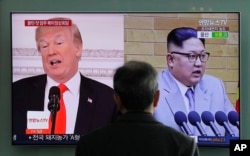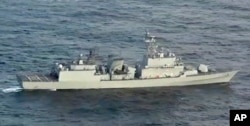Relations between South Korea and Japan continue to sour as a pair of diplomatic disputes creates a renewed strain on bilateral ties between Seoul and Tokyo.
However, analysts tell VOA that the crisis facing the East Asian nations stems from long-standing, unresolved issues that could ultimately affect how the countries interact on regional security issues.
Keeho Yang, a professor at the Department of Japanese studies at Sungkonghoe University, traces the current downward trend in bilateral ties to 2012, when then-President Lee Myung-bak visited Dok-do, a small set of islets also claimed by Japan and referred to as Takeshima.
“There have been no significant changes in the two countries’ relationship,” since then, he said. “It’s bad.”
Currently, both governments are embroiled in a tit-for-tat exchange over whether a South Korean naval vessel targeted a Japanese Self Defense Force fighter with fire-control radar last month and Seoul looking to seize the assets of Japanese companies following a recent court decision that requiring the firms to compensate forced laborers during World War II.
Dispute’s impact on regional issues
Despite the discussions taking place between Seoul and Tokyo to resolve the issue of asset seizure and military interactions, Yang doesn’t see the disputes affecting how the two governments communicate or work together to maintain regional security.
“The Japanese government endorsed the Panmunjom declaration. So two governments share the same view on denuclearization and peace on the Korean Peninsula,” Yang said.
The Institute for Far Eastern Studies at Kyungnam University’s Cho Jin-goo also agreed that Tokyo’s support for North Korea’s denuclearization is important, but if the current disagreements can’t be resolved in a relatively short period of time, it could affect larger issues.
“So the longer the dispute lasts, the worse the relationship [between Seoul and Tokyo] will get,” Cho said.
When you “look at what actually goes on between the two countries, economically, tourist-wise, militarily ... it doesn’t really change all that much. But it’s not as good as it should be,” said Grant Newsham, a senior research fellow with the Japan Forum for Strategic Studies in Tokyo. “Particularly on the military front.”
He sees the current cycle of good and bad relations between Seoul and Tokyo continuing for the foreseeable future.
Yang recommends both governments continue to work together to resolve the ongoing differences and for the leaders to meet to establish “forward-looking relations.”
Ongoing radar row
South Korea and Japan met in Singapore Monday to discuss a Dec. 20 incident involving a radar lock between a South Korean warship and a Japanese P-1 maritime patrol aircraft.
Seoul requested that Tokyo apologize for the aircraft flying low and possibly posing a threat against its vessel, which was on a humanitarian operation.
Japan disputes South Korea’s version of events, and Japanese Prime Minister Shinzo Abe urged Seoul to put in place procedures to prevent similar incidents in the future.
In addition, Japanese media reports that Tokyo’s defense ministry summoned the South Korean military attache to lodge a formal complaint and demanded a retraction of Seoul’s claim.
South Korea’s defense ministry said Japan failed in those talks to provide definitive evidence backing its claim.
“Japan did not disclose the radar frequency data that it has about our warship, which is a smoking gun, and instead only asked for information from South Korea. Such a demand is extremely rude and unacceptable,” said ministry spokeswoman Choi Hyun Soo.
She further told reporters Tokyo’s request indicated a lack of desire on Japan’s part to resolve the matter.
Both sides are expected to continue to hold discussions on the matter.








